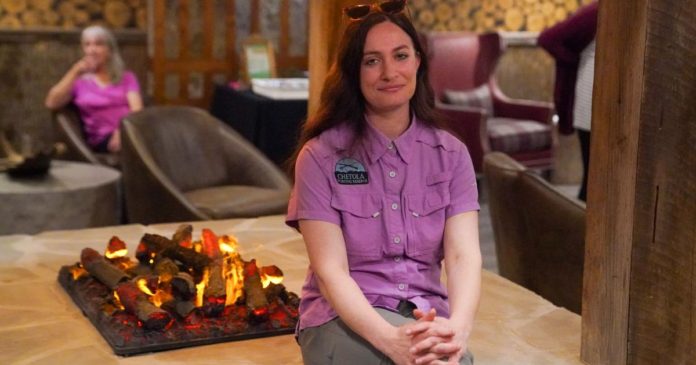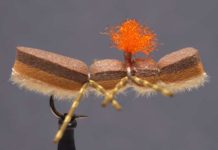Morgan Tarbutton is the fly-fishing manager for Chetola Resort in Blowing Rock.
BLOWING ROCK — As it turns out, a double major in biology and criminal justice, with a minor in psychology while earning a bachelor’s degree from Appalachian State University was a perfect fit for Morgan Tarbutton’s eventual career in fly-fishing. Of course, it also helps that she has a father and uncle to mentor her in all things business.
“I love the outdoors and always have,” said Tarbutton. “For quite a few years I was in guest services here at Chetola and while I enjoyed it, as soon as my uncle, Greg Tarbutton, decided to start an outdoor sports part of what we do, I was the first to raise my hand, jump up and down and scream, ‘Pick me! Pick me! Pick me!’”
Tarbutton is now fly-fishing manager for Chetola and loving every minute of it.
“I have been fishing for as long as I can remember,” she said. “It is one of my passions. I went to Blowing Rock School and I won’t tell you how long ago, but I graduated from the old Watauga High School.
“Like a lot people, I grew up fly fishing with my grandfather, who wanted to take fish home for dinner,” Tarbutton said. “I was recently involved with the Blowing Rock Trout Derby, which is a terrific way for families to spend outdoor recreational time together as well as promote the sport of fishing for fun. I am going to try and get Chetola even more involved and the rest of the town needs to get more involved, too, especially businesses. I love an event that might get people to drive up from Charlotte and even Georgia to get their kids outdoors, offers wonderful prizes, is backed by wonderful people, and is a year-after-year thing. We are going to buckle down and get more people and their businesses involved. Maybe we can get a catch and release competition, and get Orvis and Trout Unlimited involved. I really see some good things coming into this event and for Blowing Rock in the future, building on its strong, now 42-year foundation.”
To speak with Tarbutton about fly fishing is to open up several cans of worms. Even then, she laughs with one-upmanship when it comes to a play on words with fishing lingo.
Last week, Chetola hosted a grand opening for its new Orvis®-certified fly shop, a richly appointed retail space with racks and shelves full of fishing gear and fishing-themed sports apparel, but in the center is an open fire pit surrounded by leather chairs. Toward the back, there are coffee-type beverages and other consumables.
“This is a great place for our guests to hang out while waiting for a fishing expedition, but you also do a lot of wading – with a ‘d’ – in the water when you are out in a stream, fly-fishing. So, our store is called ‘The Wading Room’ and, yes, the play on words is intentional. And I could go on and on, like ‘We hope to lure some sales’ or ‘We are here to reel in some sales.’ Then again, ‘We hold some tight lines on all of our profit margins,’” Tarbutton said, with a knowing smile.
“Seriously, though, we are an Orvis® authorized retailer. You will see a couple of different brands coming into the store besides Orvis, but obviously the first thing we are doing is promoting fly-fishing. It is also a coffee shop. If any of our guests want to come in, relax, maybe share a couple of fishing stories, enjoy a nice cup of coffee or even a latte before or after a fishing trip, this is the perfect place. Maybe they will also find some gear they want or need while they wait, too.”
Not long into a conversation, the Tarbutton business genes inherited from her father, Kent Tarbutton, surface in the words of the fly fishing manager.

Morgan Tarbutton, left, is fly-fishing manager for Chetola Resort, which is owned by her father, Kent Tarbutton (pictured here), and her uncle, Greg Tarbutton.
“Chetola had been the oldest Orvis®-endorsed lodge in North Carolina and part of that endorsement was because of our Orvis® gift shop. But we were limited on space with the original shop. Frankly, it took time to convince everyone that there was sufficient interest in fly-fishing for there to be a fly shop here in Blowing Rock and for our guests. By enlarging our space here in the lodge, we expanded our inventory to better serve our customers,” explained Tarbutton about the business model.
“This space was previously the Blue Ridge Room and a good bit of that functionality is still here, providing us with a lot of spatial flexibility. The back section can be closed off for private meetings or maybe as a place where the bridesmaids can change for one of the many weddings we host. It might particularly come in handy if it is raining outside,” she said.
Further into a conversation with Tarbutton, her educational background in biology, criminal justice, and psychology becomes evident. And she isn’t talking about outfoxing the fish by getting into their heads.
“A topic that a lot of people are scared to touch — because ultimately it involves the North Carolina Wildlife Resources Commission — is trying to get some better programs for our public access waters,” said Tarbutton.
“I know they have the best intentions in mind, but the Wildlife Resources commission only stocks fish in public waters that are sterile,” she went on to explain. “There is nothing genetically wrong with them and most anglers won’t know the difference between a wild trout and a stocked trout, but every single one of their trout is meant to die without reproducing. In their meetings, they will make that statement. They know that their trout are a resource not meant to continue.
“As a consequence,” Tarbutton continued, “North Carolina has places where there are sterile fish that will not survive the season but they are competing for resources with trout that will survive, that will breed, and will keep our fresh water streams populated.”

Chetola’s The Wading Room is an Orvis-certified retailer, featuring high quality fly-fishing equipment and sports apparel.
Why stock only sterile fish?
“It is a money-per-pound value proposition,” said Tarbutton. “Rainbow trout are less aggressive. One rainbow trout will grow 25 percent faster if they are sterile and can sit there to swim in one space without competition for resources. A brown trout needs three times the amount of room because they are more aggressive and will fight for those resources. The state wants their trout, pound for pound, to get to the public as fast as possible vs. the cost that is required to grow them. The less feed they have to put into a hatchery, the better. So, a sterile fish that is not having to produce eggs, for instance, sees that energy going directly into fat production. Consequently, the fish can double in size pretty quickly.”
The Chetola fly fishing manager applauded Wildlife Resources’ good programs, such as delayed harvests where they shut down certain streams for fishing to allow the trout to repopulate, naturally.
“But right now there is no chance for them to come back and reassess streams that they have already designated as ‘can’t hold trout populations’ or ‘can’t hold mixed trout populations.’ I would love to see a program that we and others might sponsor where every five or six years we go back and test some of those streams to see if now they can’t support wild trout populations. I could name several streams as candidates,” said Tarbutton.

During the grand opening of The Wading Room, Chetola’s fly-fishing manager Morgan Tarbutton takes a moment to ‘chill’ with colleagues and friends. Pictured, from let to right are general manager Angus Lamond, Bob Timberlake, Tarbutton, Blowing Rock Chamber of Commerce membership director Cathy Barker, Chetola marketing manager P.J. Wirchansky, and Blowing Rock Chamber of Commerce CEO Charles Hardin.
Climate change, in recent years, emerged as one of the threats to the survival of trout populations. According to a 1999 publication by the U.S. Environmental Protection Agency entitled “Climate Change and Cold Water Fish,” a mere 8-degrees Fahrenheit was predicted to eliminate half of the native brook trout population in the Southern Appalachian Mountains. Trout prefer cold water streams in which to spawn and live but warming water temperatures are altering these ecosystems and deteriorating native trout populations.
Asked what prevents trout from surviving in a stream, Tarbutton built on the climate change theme, saying, “Well, it is typically not pollution as some people might first think, but stream temperatures. Here in Blowing Rock, Chetola Lake is a warming base, even though it is not intended to be. As we build more developments in town, more sediments and silt comes downstream to settle in the lake, making it shallower, and so warmer. And the more trees that get cut along the riverbanks, the streams have less access to shade. Sunlight warms the water.
“With all of that sediment and silt coming into Chetola Lake, we have to dredge it out every five to seven years simply because the silt is not handled correctly upstream,” said Tarbutton. “I am wondering if there could be some tax breaks or other kinds of incentives for people to plant things along the riverbanks upstream. That would not only increase the shade for the water, but would also reduce the amount of silt that flows downstream. How about a government grant to come in here and dredge the lake out? A deeper lake means cooler water to support the trout population.”
Morgan added, “Create programs with other agencies like Watauga Riverkeepers to put monitors on the headwaters so that when we have a large rainstorm, we have a system to measure the amount of water coming into the lake and maybe releases at the bottom of the dam, so the silt does not all build up in the lake. It will only take a drop in temperature of three or four degrees to support wild trout back in the lake and the streams here,” said Tarbutton.
For Tarbutton, there is purpose behind the proverbial madness.
“We simply want to make sure that we are not dependent on the state for trout populations,” she said. “We want to have our special areas that are protected and know they are not competing for resources or worried about people coming in and poaching above their limit. Trout is a fish species that can repopulate an entire stream, if protected.”
Tarbutton said she is hoping that Chetola can get even more involved with conservation groups.
“We want to do more with groups like Blue Ridge Conservancy. We used to do more before COVID-19 and want to get back there. We think it is important not just to protect, but to give back, too,” she said.
“For instance, we have this beautiful 7-acre lake here at Chetola. We can do fly-fishing competitions, for example, and give proceeds from the event back to organizations that are really trying to protect our natural resources. Of course, that is good for the streams as well as for the trout,” said Tarbutton.
Carving Out a Market Niche
The burning question of the day, of course, was “Where are the best fishing holes?”
“I am not going to tell you that. It’s our private secret!
“And we keep them a secret on purpose,” said Tarbutton. “The demand for fly-fishing seems to have exploded in our area. Given the demand, we have the option of hiring guides left and right to keep up with the number of trips people want, but that would also put limits on what makes us special. I maintain there is a big difference between hiring a fly-fishing guide and a fly-fishing instructor.
“A guide wants to take you to the easiest spot and put you in a community of fish so he can collect a big tip and go home. An actual fly-fishing instructor takes where you are with your current skills and teaches you how to move on to the next level, regardless of what you feel that next level is.
“The instructor shows you exactly how and why something works so you can take that knowledge back out on your own the next day or for the next trip. That’s why here at Chetola we have kept it small and our waters small. North Carolina has hundreds of miles of stocked, public fly-fishing water. If you have so many people going after a certain area, our ability to provide quality trips for our guests stops.
“So, we have started providing private waters where we can guarantee there will be plenty of fish and there won’t be a hundred people standing arm-to-arm. It is going to be you and your family and friends enjoying the beauty and the quality of the North Carolina mountains which, honestly, is the real reason people come up here,” said Tarbutton. “Of course, we have some 20-inch trout and that gets people interested, too.”
Credit: Source link





























